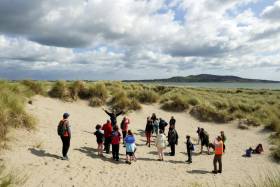Displaying items by tag: Coastal Walks
Coastal Walks Could Be Part of 2.4 Million Euro Trail Development Scheme
Coastal walks could become national trails under a €2.4 million scheme to develop 70 new walking trails across the country.
Coastal farmers and landowners, trail management committees, community groups and local authorities will be eligible to apply for grants under the scheme, which aims to increase outdoor trails from 80 to 150 over the next two years.
The new scheme has been rolled out by Minister for Rural and Community Development, Heather Humphreys, who has called for expressions of interest, with a closing date of June 23rd.
The Walks Scheme was launched in 2008 to facilitate the development and maintenance of key walking trails by private landholders.
 Minister for Rural and Community Development, Heather Humphreys
Minister for Rural and Community Development, Heather Humphreys
The scheme is administered by 20 Local Development Companies (LDCs) on behalf of the department.
Ms Humphrey’s department funds 21 Rural Recreation Officers (RROs) in these LDCs, with a contribution from Fáilte Ireland.
The tourism body assists with the delivery of the scheme and supports other rural recreation initiatives at a local level.
More information on the National Outdoor Recreation Strategy 2023-2027 is here.
National Heritage Week (18-26 August) Also Takes to the Seas
#HeritageWeek - Its that time of year again as National Heritage Week (18-26 August) begins tomorrow. Numerous events on land will be held across the country in addition to those of a nautical theme and directly taking place at sea.
Most of the week's events involving local communitiy organisations are free while others may require booking involving a fee. The programme highlights the abundance of great work that is carried out in all communities in Ireland to preserve and promote our natural, built and cultural heritage.
National Heritage Week is part of European Heritage Days. This is a joint initiative of the Council of Europe and the European Union in which over forty countries participate each year.
Afloat has picked a handful of events associated with the sea, for further information click the accompanying links. As for all other events covering a broad range of interests click What's On in addition to twitter and facebook.
Coastal & Island Heritage Cruise (18 - 26 August: 10:30am - 12:30pm) BOOKING REQUIRED Saoire Mara Charters, Kincasslagh Pier, Co. Donegal. For details click HERE
Dalkey Town and Coastal Walk (22 August: 7pm - 8pm) Anna Scudds, Dun Laoghaire Borough Historical Society, Dalkey Church, Car Park Co. Dublin, Dún Laoghaire-Rathdown. Click HERE
Launch of a Restored Foyle Ferry (25 August: 1pm - 5pm) Moville Men's Shed, Moville Pier, Co. Donegal. For details click HERE
Experience Wild Atlantic Waves (26 August: 5pm - 9pm) Achill Yawl Heritage Day, Achill Sound, Co. Mayo. For details click HERE
In addition Afloat highlights an Irish Naval Service 'Open Ship' event held in Cork City Quays as part of Cork Heritage Week. This one-day naval event takes place tomorrow, Saturday, 18 August, when LÉ Orla will be open to the public for guided tours along the South Jetties.
Crew members of the Coastal Patrol Vessel (CPV) will present the tours between 10:00-12:30 and 14:00-17:00. Should there be updates, please consult the INS facebook HERE.




























































